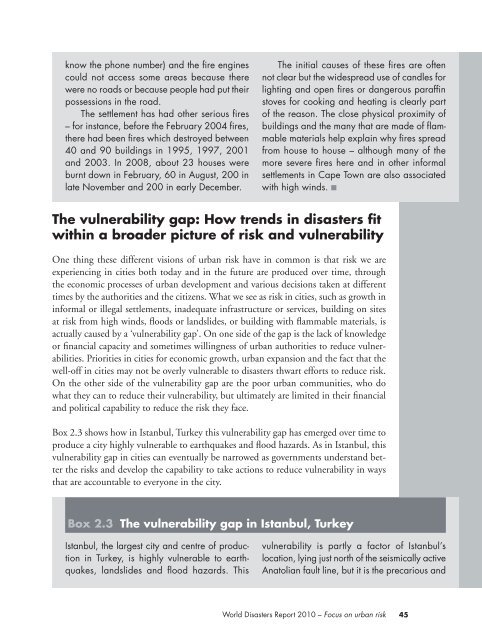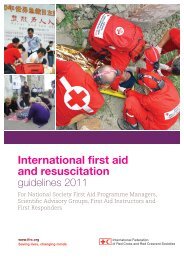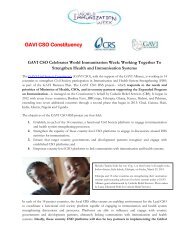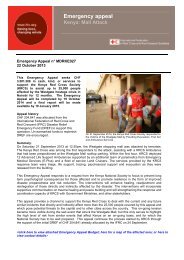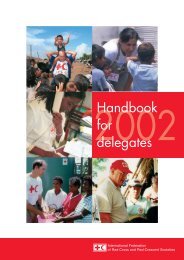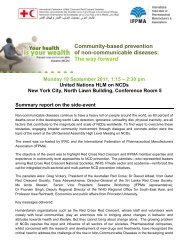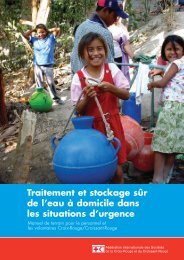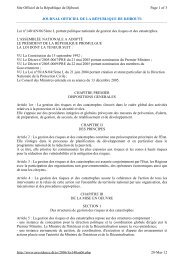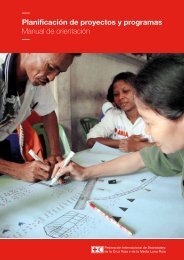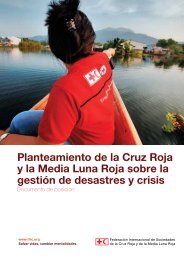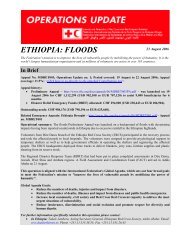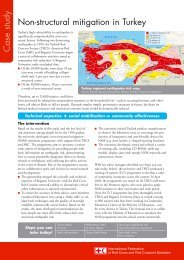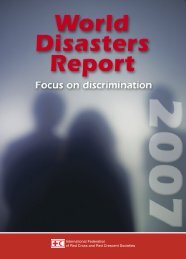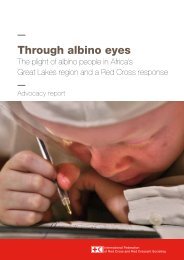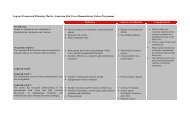World Disasters Report 2010 - International Federation of Red Cross ...
World Disasters Report 2010 - International Federation of Red Cross ...
World Disasters Report 2010 - International Federation of Red Cross ...
Create successful ePaper yourself
Turn your PDF publications into a flip-book with our unique Google optimized e-Paper software.
know the phone number) and the fire engines<br />
could not access some areas because there<br />
were no roads or because people had put their<br />
possessions in the road.<br />
The settlement has had other serious fires<br />
– for instance, before the February 2004 fires,<br />
there had been fires which destroyed between<br />
40 and 90 buildings in 1995, 1997, 2001<br />
and 2003. In 2008, about 23 houses were<br />
burnt down in February, 60 in August, 200 in<br />
late November and 200 in early December.<br />
The vulnerability gap: How trends in disasters fit<br />
within a broader picture <strong>of</strong> risk and vulnerability<br />
One thing these different visions <strong>of</strong> urban risk have in common is that risk we are<br />
experiencing in cities both today and in the future are produced over time, through<br />
the economic processes <strong>of</strong> urban development and various decisions taken at different<br />
times by the authorities and the citizens. What we see as risk in cities, such as growth in<br />
informal or illegal settlements, inadequate infrastructure or services, building on sites<br />
at risk from high winds, floods or landslides, or building with flammable materials, is<br />
actually caused by a ‘vulnerability gap’. On one side <strong>of</strong> the gap is the lack <strong>of</strong> knowledge<br />
or financial capacity and sometimes willingness <strong>of</strong> urban authorities to reduce vulnerabilities.<br />
Priorities in cities for economic growth, urban expansion and the fact that the<br />
well-<strong>of</strong>f in cities may not be overly vulnerable to disasters thwart efforts to reduce risk.<br />
On the other side <strong>of</strong> the vulnerability gap are the poor urban communities, who do<br />
what they can to reduce their vulnerability, but ultimately are limited in their financial<br />
and political capability to reduce the risk they face.<br />
Box 2.3 shows how in Istanbul, Turkey this vulnerability gap has emerged over time to<br />
produce a city highly vulnerable to earthquakes and flood hazards. As in Istanbul, this<br />
vulnerability gap in cities can eventually be narrowed as governments understand better<br />
the risks and develop the capability to take actions to reduce vulnerability in ways<br />
that are accountable to everyone in the city.<br />
Box 2.3 The vulnerability gap in Istanbul, Turkey<br />
Istanbul, the largest city and centre <strong>of</strong> production<br />
in Turkey, is highly vulnerable to earthquakes,<br />
landslides and flood hazards. This<br />
The initial causes <strong>of</strong> these fires are <strong>of</strong>ten<br />
not clear but the widespread use <strong>of</strong> candles for<br />
lighting and open fires or dangerous paraffin<br />
stoves for cooking and heating is clearly part<br />
<strong>of</strong> the reason. The close physical proximity <strong>of</strong><br />
buildings and the many that are made <strong>of</strong> flammable<br />
materials help explain why fires spread<br />
from house to house – although many <strong>of</strong> the<br />
more severe fires here and in other informal<br />
settlements in Cape Town are also associated<br />
with high winds. �<br />
vulnerability is partly a factor <strong>of</strong> Istanbul’s<br />
location, lying just north <strong>of</strong> the seismically active<br />
Anatolian fault line, but it is the precarious and<br />
<strong>World</strong> <strong>Disasters</strong> <strong>Report</strong> <strong>2010</strong> – Focus on urban risk<br />
45


